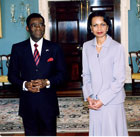(10:00 a.m. EST)
 SECRETARY RICE: Good morning. Welcome. I'm very pleased to welcome the President of Equatorial Guinea, President Obiang. We will have a full set of discussions about our bilateral relationship, about some innovative social programs that USAID is involved with and about the range of regional issues that we both confront. So thank you very much for your presence here. You are a good friend and we welcome you.
SECRETARY RICE: Good morning. Welcome. I'm very pleased to welcome the President of Equatorial Guinea, President Obiang. We will have a full set of discussions about our bilateral relationship, about some innovative social programs that USAID is involved with and about the range of regional issues that we both confront. So thank you very much for your presence here. You are a good friend and we welcome you.
PRESIDENT OBIANG: (Via interpreter) I thank you so much. We have extremely good relations with the United States. Our country has had good relations with the United States for a very long time and my visit here is simply in order to consolidate and also to establish further ties of cooperation with your country. Yesterday, in fact, we signed a very important agreement with USAID, an agreement for the development of Equatorial Guinea which will be helped with financing from the United States for social programs in our country so that our people may enjoy greater prosperity and are able to combat poverty.
Therefore, we are extremely pleased and hopeful that this relationship will continue to grow in friendship and cooperation, and I thank you very much.
SECRETARY RICE: One question. Yes, sir.
QUESTION: Madame Secretary, Iran has begun its enrichment of uranium. Is it time to take stronger action against Tehran and have they crossed a red line and should the UN Security Council now impose financial or other sanctions? Should there be an emergency meeting?
SECRETARY RICE: Let me remind everyone that the international community made a very clear statement through the presidential statement that was adopted by the Security Council and that that statement required Iran to live up to the obligations that were to be imposed upon it by the IAEA from its February board meeting. That meant that Iran was to suspend its enrichment activities and it was to return to negotiations, and this was a clear indication that the world is very concerned about the course of nuclear developments in Iran. This is not a question of Iran's right to civil nuclear power. This is a question of that the world does not believe that Iran should have the capability and the technology that could lead to a nuclear weapon. Iran has a long period trying to reestablish confidence with the international system given its behavior.
Now, this latest announcement yesterday by the Iranian regime is just a step that is going to further isolate Iran. It demonstrates that Iran is not adhering to the international community's requirements. And I do think that the Security Council will need to take into consideration this move by Iran and that it will be time when it reconvenes on this case for strong steps to make certain that we maintain the credibility of the international community on this issue.
Iran has been offered many opportunities to negotiate in good faith -- by the Europeans, by the Russians. They've never taken those opportunities. They are -- we've had a presidential statement that made numerous -- that reinforced those requirements. The Iranians did not react to that. And so yes, when we -- we're consulting now and when the Security Council reconvenes, I think it will be time for action.
QUESTION: Madame Secretary, we have experts saying that as ominous as this may be, there's a lot, very, very much more, that Iran has to accomplish in order to pose a nuclear threat. They haven't got the equipment. They have -- there are all sorts -- they don't have the same -- they don't have a reactor. Is it -- should Americans be alarmed or alert, or what?
SECRETARY RICE: We are going to be steady in our diplomatic track here because we believe that a concerted and coherent diplomatic policy that the world is behind will convince the Iranians that they have to come back into compliance with what the international community is demanding of them. But there are demands on the table and the Iranians need to accede to those demands. This is also, as I said, an issue for the Security Council that issued this presidential statement and so we're consulting with our allies about what the next steps need to be. But there's no doubt in my mind that if the Iranians continue down this course there has to be some course of action by the Security Council.
Thank you very much.
2006/367

